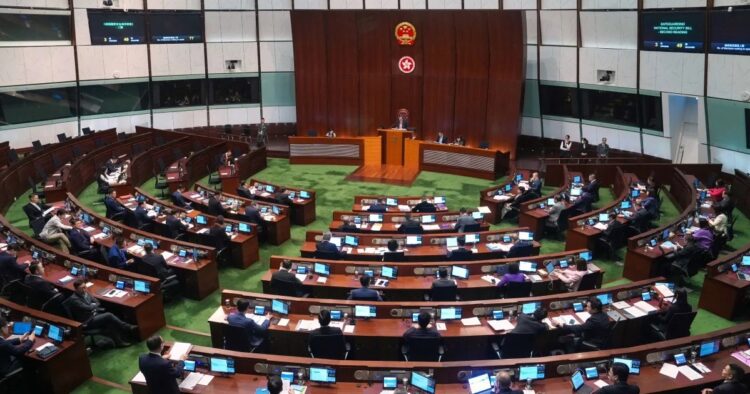In a swift move, the Legislative Council of Hong Kong unanimously approved a new national security bill on Tuesday, March 19. The bill, introduced just two weeks prior, has drawn criticism for potentially further restricting the city’s freedoms under Chinese rule.
Dubbed as “Article 23,” the legislation targets acts of treason, sabotage, sedition, theft of state secrets, and espionage. Penalties for these offenses include life imprisonment. The bill was presented to the 90-seat council, which is predominantly composed of pro-Beijing members, on March 8, following a month-long public consultation period. Hong Kong’s leader, John Lee, urged for its swift enactment, which was met with unanimous agreement from all 88 lawmakers and the council president.
The proposed law will be incorporated into Hong Kong’s mini-constitution and will work alongside the existing national security law imposed by China’s central government in 2020. Article 23, outlined in the territory’s Basic Law enacted after the 1997 handover from British colonial rule, mandates the prohibition of acts endangering national security.
This move comes after previous attempts to introduce similar laws in 2003 faced widespread protests. In response to the 2019 pro-democracy demonstrations, China imposed a separate national security law on Hong Kong, citing the local government’s failure to legislate Article 23.
The new law encompasses five broad categories of offenses: treason, insurrection, espionage, destructive activities endangering national security, and external interference. Despite assurances from Lee that the law would respect human rights and freedoms, he acknowledged that most rights were “not absolute.” He argued that the 2019 protests highlighted the importance of national security for the enjoyment of rights and freedoms.
The consultation document, set for release on Tuesday, will address concerns such as the definition of theft of state secrets and the “extraterritorial effect” of the law. Public feedback on the law will be accepted until February 28, as announced by Lee during a press conference.
Hong Kong’s secretary for security, Tang Pink-keung, stated that the consultation document would also address “shortcomings” in the current handling of alleged national security cases. Among these cases is the trial of newspaper proprietor and activist Jimmy Lai, currently before a national security court after about a year of successive delays. Lai faces charges of conspiracy to collude with foreign forces under the National Security Law (NSL), as well as sedition charges under a separate law. He has pleaded not guilty and could face life in prison if convicted.

















Comments